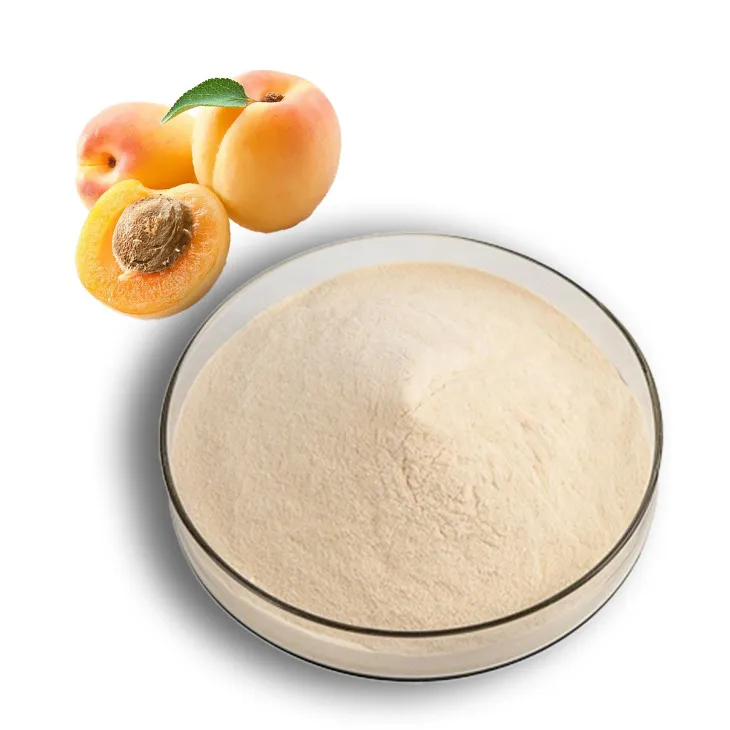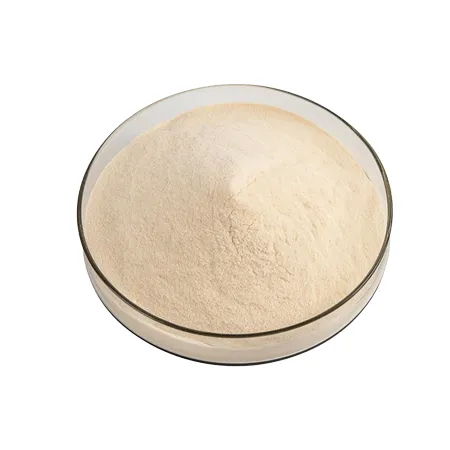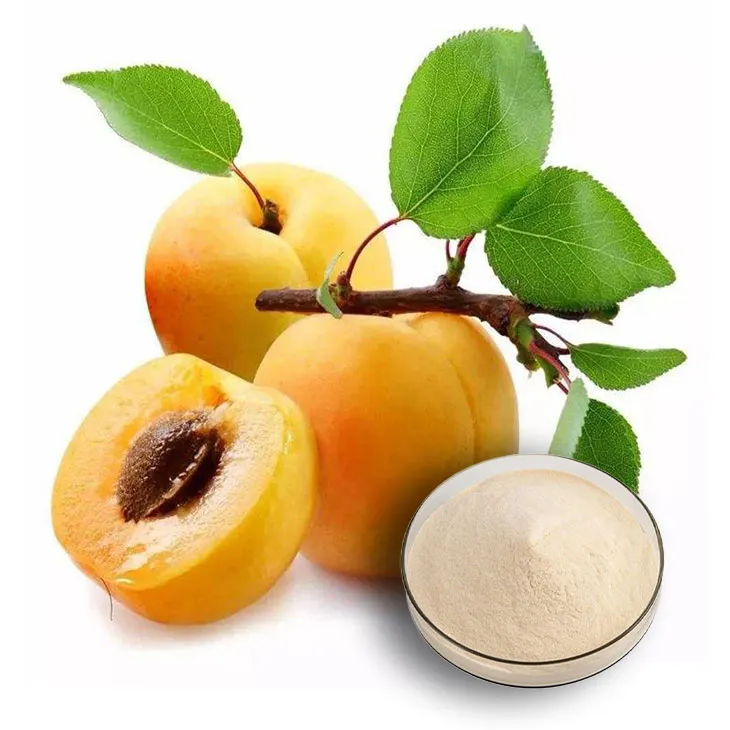- 0086-571-85302990
- sales@greenskybio.com
Which type of apricot powder should you use?
2024-12-21

1. Introduction
Apricot Powder has become a popular ingredient in various aspects of our lives, from culinary creations to potential health boosters. However, not all Apricot Powders are the same. There are different types available, each with its own set of characteristics. Understanding these differences can help you make a more informed choice when it comes to using Apricot Powder.

2. Types of Apricot Powders
2.1 Sweet Apricot Powder
Sweet apricot powder is made from sweet apricot varieties. These apricots are known for their pleasant taste, which is naturally sweet and somewhat fruity. They are often used in desserts and sweet recipes.
One of the main advantages of sweet apricot powder is its versatility in baking. It can be added to cakes, muffins, and cookies to impart a unique apricot flavor. For example, in a vanilla cake recipe, adding a spoonful of sweet apricot powder can transform the flavor profile, giving it a subtle yet distinct apricot undertone.
2.2 Bitter Apricot Powder
Bitter apricot powder, on the other hand, is derived from bitter apricots. These apricots have a more astringent taste compared to their sweet counterparts. However, they also have their own set of benefits.
Bitter apricot powder is often used in traditional medicine in some cultures. It is believed to have certain health - promoting properties, such as aiding in digestion and potentially having anti - inflammatory effects. In cooking, it is less commonly used in sweet dishes directly but can be an interesting addition to savory recipes. For instance, it can be used in a marinade for meats to add a unique flavor dimension.

3. Nutritional Differences
Both sweet and bitter apricot powders have nutritional value, but there are some differences to note.
3.1 Sweet Apricot Powder Nutrition
Sweet apricot powder is a good source of vitamins, particularly vitamin A, which is important for eye health. It also contains vitamin C, which is an antioxidant that helps boost the immune system. Additionally, it has dietary fiber, which can aid in digestion and promote a feeling of fullness.
However, it also contains natural sugars, so it should be consumed in moderation, especially for those watching their sugar intake. For example, a tablespoon of sweet apricot powder may contain around 5 - 8 grams of sugar.
3.2 Bitter Apricot Powder Nutrition
Bitter apricot powder contains some of the same nutrients as sweet apricot powder, such as vitamins A and C. But it may also have additional compounds that are unique to bitter apricots. Some studies suggest that bitter apricots may contain certain bioactive substances that could have potential health benefits.
It should be noted that bitter apricot powder may also contain small amounts of compounds that can be toxic in large quantities. Therefore, it is important to use it in moderation and ensure that it is sourced from a reliable and safe source.

4. Applications in Cooking and Baking
4.1 In Baking
As mentioned earlier, sweet apricot powder is a great addition to baking. It can be used in a variety of baked goods:
- Cakes: Whether it's a simple sponge cake or a rich chocolate cake, sweet apricot powder can add a touch of fruity flavor. For a fruity twist on a classic chocolate cake, you can add 2 - 3 tablespoons of sweet apricot powder to the batter.
- Muffins: Muffins can be made more interesting with the addition of sweet apricot powder. Try adding it to blueberry muffins for a combination of flavors, or make apricot - only muffins for a pure apricot experience.
- Cookies: Apricot - flavored cookies can be a delicious treat. Incorporate sweet apricot powder into your cookie dough, along with some chopped dried apricots for added texture.
4.2 In Cooking
Bitter apricot powder can be used in cooking, especially in savory dishes:
- Meat Marinades: A marinade made with bitter apricot powder, along with some spices like garlic, ginger, and cumin, can add a unique flavor to meats. This is especially popular in some Middle Eastern and Asian cuisines.
- Sauces: Bitter apricot powder can be used to thicken and flavor sauces. For example, in a barbecue sauce, adding a small amount of bitter apricot powder can give it a more complex flavor profile.
- Soups: In certain soups, such as lentil or vegetable soups, a sprinkle of bitter apricot powder can add an unexpected depth of flavor.
5. Health Benefits
5.1 Health Benefits of Sweet Apricot Powder
Besides the nutritional benefits mentioned earlier, sweet apricot powder may have other health - related advantages.
- Skin Health: The vitamins A and C in sweet apricot powder are beneficial for skin health. Vitamin A helps in cell regeneration, while vitamin C is important for collagen production, which can keep the skin looking youthful and healthy.
- Heart Health: The dietary fiber in sweet apricot powder can help in reducing cholesterol levels, which is beneficial for heart health. Additionally, the antioxidants may also play a role in protecting the heart from oxidative stress.
5.2 Health Benefits of Bitter Apricot Powder
As previously stated, bitter apricot powder has been associated with certain health - promoting properties in traditional medicine.
- Digestive Aid: It is believed to help in digestion. The bitter compounds in bitter apricot powder may stimulate the production of digestive enzymes, which can improve the digestion process.
- Anti - Inflammatory Effects: Some studies suggest that bitter apricot powder may have anti - inflammatory properties. This could potentially be beneficial for people with inflammatory conditions such as arthritis.
6. Quality, Purity, and Origin
6.1 Quality
When choosing apricot powder, quality is of utmost importance. High - quality apricot powder should have a fine texture, free from lumps. It should also have a strong and pure apricot flavor.
One way to assess the quality is to check the color. A good - quality sweet apricot powder should have a vibrant orange - yellow color, while a bitter apricot powder may be a bit darker. However, beware of powders that have an overly bright or artificial - looking color, as this could indicate the use of additives or poor - quality apricots.
6.2 Purity
Purity is another crucial factor. Pure apricot powder should contain only apricot ingredients, without any added fillers, preservatives, or artificial flavors. Read the label carefully to ensure that you are getting a pure product.
Some low - quality apricot powders may contain added sugars, starches, or other substances to cut costs or improve the texture. These additives can affect the taste and nutritional value of the powder.
6.3 Origin
The origin of the apricots used to make the powder can also impact its quality. Apricots grown in certain regions may be known for their superior flavor or higher nutrient content.
For example, apricots from regions with a warm and dry climate, such as some parts of California in the United States or certain areas in Central Asia, are often considered to produce high - quality apricots. Knowing the origin of the apricot powder can give you an idea of its potential quality.
7. Conclusion
In conclusion, when choosing which apricot powder to use, it is important to consider the type (sweet or bitter), the nutritional differences, the applications in cooking and baking, and the factors of quality, purity, and origin. Whether you are using it for its delicious flavor in culinary creations or for its potential health benefits, making an informed choice will ensure that you get the most out of your apricot powder.
FAQ:
What are the main differences between sweet apricot powder and bitter apricot powder?
Sweet apricot powder is generally milder in flavor compared to bitter apricot powder. Nutritionally, bitter apricot powder may contain certain compounds in different amounts. For example, bitter apricots might have more of some bioactive substances. In cooking and baking, sweet apricot powder is often used to add a sweet and fruity flavor to desserts like cakes and muffins, while bitter apricot powder is sometimes used in more traditional or medicinal recipes due to its unique properties.
How can I determine the quality of apricot powder?
One way to determine the quality of apricot powder is to check the origin. Powders sourced from regions known for high - quality apricots are more likely to be of good quality. Also, look at the texture. High - quality apricot powder should be fine and evenly ground without lumps. The color can also be an indicator; it should be a natural color associated with apricots. Additionally, check for any additives or preservatives. Pure apricot powder should have minimal or no added substances.
What are the potential health benefits of using apricot powder?
Apricot powder can be a good source of vitamins such as vitamin A, which is beneficial for eye health. It also contains dietary fiber, which can aid in digestion. Depending on the type, it may have antioxidant properties that help fight against free radicals in the body. Some apricot powders, especially those from bitter apricots, may have traditional medicinal uses related to respiratory health, although more research is needed in this area.
Can apricot powder be used in savory dishes?
Yes, apricot powder can be used in savory dishes. In some Middle Eastern or North African cuisines, apricot powder is used to add a touch of sweetness and fruity flavor to tagines or stews. It can balance the spiciness or saltiness of the dish. It can also be used in marinades for meats, giving a unique flavor profile.
How should I store apricot powder to maintain its freshness?
Apricot powder should be stored in a cool, dry place, away from direct sunlight. An airtight container is ideal to prevent moisture from getting in, which can cause clumping or spoilage. If stored properly, apricot powder can maintain its freshness for several months to a year, depending on the quality and processing methods.
Related literature
- The Nutritional Profile of Apricot - Based Products"
- "Apricot Powders in Culinary and Medicinal Applications"
- "Quality Assessment of Dried Apricot Powders"
- ▶ Hesperidin
- ▶ citrus bioflavonoids
- ▶ plant extract
- ▶ lycopene
- ▶ Diosmin
- ▶ Grape seed extract
- ▶ Sea buckthorn Juice Powder
- ▶ Beetroot powder
- ▶ Hops Extract
- ▶ Artichoke Extract
- ▶ Reishi mushroom extract
- ▶ Astaxanthin
- ▶ Green Tea Extract
- ▶ Curcumin Extract
- ▶ Horse Chestnut Extract
- ▶ Other Problems
- ▶ Boswellia Serrata Extract
- ▶ Resveratrol Extract
- ▶ Marigold Extract
- ▶ Grape Leaf Extract
- ▶ blog3
- ▶ blog4
- ▶ blog5
-
Pure 85% Tomentil Extract.
2024-12-21
-
Quercetin
2024-12-21
-
White Peony Extract
2024-12-21
-
American Ginseng Root Extract
2024-12-21
-
Lemon Juice Powder
2024-12-21
-
Kupilu Extract
2024-12-21
-
Mangosteen extract powder
2024-12-21
-
Lemon Balm Extract
2024-12-21
-
Horse Chestnut Extract
2024-12-21
-
Echinacea Extract
2024-12-21
-
Panax Ginseng Leaf Extract
2024-12-21





















